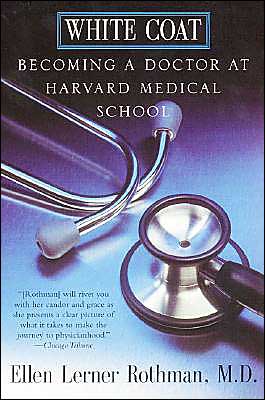White Coat: Becoming a Doctor at Harvard Medical School
White Coat is Dr. Ellen Lerner Rothman's vivid account of her four years at Harvard Medical School. Describing the grueling hours and emotional hurdles she underwent to earn the degree of M.D., Dr. Rothman tells the story of one woman's transformation from a terrified first-year medical studen into a confident, competent doctor.\ Touching on the most relevant issues in medicine today—such as HMOs, aIDS, and assisted suicide—Dr. Rothman recounts her despair and exhilaration as a medical...
Search in google:
In White Coat, Ellen Rothman offers a vivid account of her four years at one of the best medical schools in the country, and opens the infamously closed door between patient and doctor. Touching on today's most important medical issues—such as HMOs, AIDS, and assisted suicide—the author navigates her way through despair, exhilaration, and a lot of exhaustion in Harvard's classrooms and Boston's hospitals to earn the indisputable title to which we entrust our lives.With a thoughtful, candid voice, Rothman writes about a wide range of experiences—from a dream about holding the hand of a cadaver she had dissected to the acute embarrassment she felt when asking patients about their sexual histories. She shares her horror at treating a patient with a flesh-eating skin infection, the anxiety of being "pimped" by doctors for information (when doctors quiz students on anatomy and medicine), as well as the ultimate reward of making the transformation and of earning a doctor's white coat.For readers of Perri Klass, Richard Selzer, and the millions of fans of ER, White Coat is a fascinating account of one woman's journey through school and into the high-stakes drama of the medical world.
WhiteCoat\ "You'll never ever guess what I did," Roy said over the phone. He had just returned from a clinic where he followed a physician as he saw his patients.\ Roy was the first member of our class to perform a rectal exam. In fact, besides taking blood pressure, it was the first procedure any of us had performed. The gentleman Roy practiced on was subjected to three prostate exams on that particular visit -- one from the physician and two from the medical students. But as uncomfortable as the experience must have been for the patient, it was equally awkward for Roy.\ When I told my mother about Roy's experience, she was incredulous that the patient permitted such inexperienced hands to probe his prostate. "The patient actually allowed that?"\ The only way to explain the patient's willingness was Roy's white coat. After several months of wearing mine, I was already accustomed to patient trust way out of proportion to my abilities. Another classmate questioned a patient about his diagnosis. Unfamiliar with the disease, he could only ask, "Um, do you think you could tell me more about what that is?"\ The patient replied, "I was hoping you could."\ My classmates and I received our white coats with "Harvard Medical School" embroidered on the breast in crimson cursive on the first day of orientation to medical school in our white coat ceremony. Our event in the Holmes Society was anything but ceremonious. Our class was divided randomly into four different societies, mainly for administrative purposes. Each of the four societies hosted its own ceremony, and we all met afterward for lunch, self-consciously checking one another out in the new and unfamiliarwhite lab coats. I stood near the end of a long, disorganized line in the Holmes Society office, waiting to receive my coat. By the time I reached the front, all the small coats had been given out, and I received one several sizes too large.\ "You can trade with someone," the administrative assistant said.\ A day later, wearing our coats still creased from the packaging, we attended our first patient clinic as formal members of the medical world.\ The white coat ceremony, a new idea from the administration, was intended to herald our induction into the medical community on our first day of medical school. While not the long coat of a physician or resident, the white coat signaled our medical affiliation and differentiated us from the civilian visitors and volunteers.\ This was not an affiliation I was ready to claim as a first-year medical student. Over the course of the year, after taking courses in anatomy, pharmacology, biochemistry, physiology, genetics, and embryology, I was more deeply impressed by how little I knew than by how much I had learned. Yet every Monday in ourPatient-Doctor course I found myself in my white coat interviewing still another patient.\ Despite the uncertainty of my place in the medical world, my white coat ushered me into the foreign world of the patient-doctor dynamic. To my patients, the white coat denoted the authority and trust ascribed to physicians by the general public. Most patients were not attuned to the medical hierarchy designated by coat length. A white coat is a white coat is a white coat. Never mind that my coat loudly proclaimed "medical student." I felt as if I wore the scarlet letter, but no one knew what it stood for.\ These weekly interviews as part of our Patient-Doctor course were about learning the important questions, the right mannerisms, and the appropriate responses to our patients. Our instructors taught us to take a careful, methodical history, which I more or less skillfully replicated every week with a different patient. Although the goal of these weekly patient interactions was to discover a person's experience of illness, these interviews were more about my learning process than about the patient's story. As I walked with my classmate back to the medical school from the hospital after a Patient-Doctor session, Andrea remarked, "I hate this. I'm so caught up in figuring out the next question that I can't really focus on the patient's story at all. Do you think this will ever change?"\ When I interviewed patients, they saw my white coat. Many of my patients were well into their seventies, and at twenty-two I must have seemed a child to them. The white coat masked my youth. It masked my inexperience. It masked my nervousness. Yet in the medical world my white coat did not offer the solace of anonymity but forced me to take on power that I was not ready to accept.\ As a white coat I could ask any question, and patients felt obligated to answer. They trusted me to hear their story without judgment, to understand their symptoms and their suffering, to listen with compassion. I collected information about their most personal problems and asked them about some of the most deeplyprivate parts of their physical and psychological lives. In return they learned nothing about me.\ Furthermore, these weekly interactions imposed power without responsibility. Every week I left the patients' rooms with a few pages of frantically scribbled notes, never to return. Their lives and our interaction were reduced to my chicken scratch. I had no relationship to the patients' care. My continuing obligation to the person was restricted to the requirements of confidentiality.\ Before entering medical school, I would not have thought twice about allowing a medical student to perform a rectal exam on me. The white coat would have fooled me too. While I fully appreciated the opportunity afforded me by these patients to learn how to interview and perform simple procedures, I looked forward to a time when I would be able to offer my patients concrete skills. I looked forward to growing into my white coat.\ Copyright 1999 by Ellen Lerner Rothman, M.D. White Coat. Copyright © by Ellen Rothman. Reprinted by permission of HarperCollins Publishers, Inc. All rights reserved. Available now wherever books are sold.
White Coat1First YearArriving at Harvard7Anatomy Lab19ER24Taking a Sexual History27Great Expectations32Hospice38Second YearHealing Touch47First Exam55Naming60A Conflict of Values64The Pelvic69Relationships78The Show82Boards87The Horror, the Horror91Trauma95Loss of Language99On My Way105The Clinical YearsSurgery115Procedures126Difficult Patients134Too Much154Obstetrics and Gynecology168The TABs176Misery on the Wards189Pediatrics199Jamie204AIDS214Internal Medicine227Tiger233Desperation256Relationships Reprise260The Birdman268Psychiatry276Jessica282The Power of a Question299Hazard309ER Reprise315Graduation330








